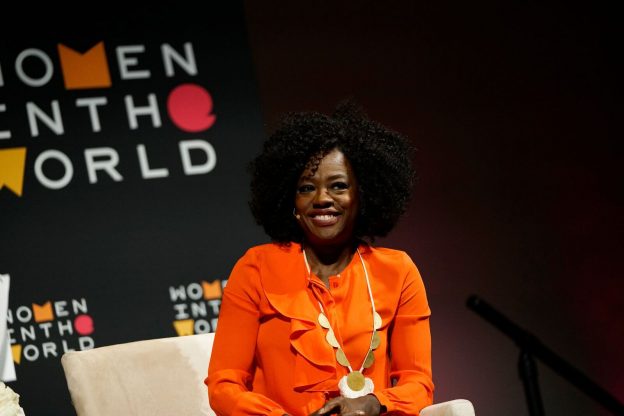Viola Davis to racist Hollywood: If I’m the black Meryl Streep then pay me, ‘I’m worthy’
Actress Viola Davis drew gasps and applause from the audience last night during an electrifying interview in Los Angeles. In a powerful conversation with Women in the World CEO Tina Brown–which ranged from Davis’ traumatic childhood to her experiences in Hollywood as a woman of color–the actress did not pull any punches about how vulnerable her rise to success has been. Even now, with a 30-year-career behind her, including Emmy, Tony and Academy awards, she shared that she still finds herself “hustling” for pay parity and substantial roles.
 “I have a career that’s probably comparable to Meryl Streep, Julianne Moore, Sigourney Weaver. They all came out of Yale, they came out of Juilliard, they came out of NYU. They had the same path as me, and yet I am nowhere near them. Not as far as money, not as far as job opportunities, no where close to it,” the 52-year-old actress observed, in a vigorous takedown of the inequities experienced by women of color in Hollywood.
“I have a career that’s probably comparable to Meryl Streep, Julianne Moore, Sigourney Weaver. They all came out of Yale, they came out of Juilliard, they came out of NYU. They had the same path as me, and yet I am nowhere near them. Not as far as money, not as far as job opportunities, no where close to it,” the 52-year-old actress observed, in a vigorous takedown of the inequities experienced by women of color in Hollywood.
“People say, ‘You’re a black Meryl Streep … We love you. There is no one like you,” she said, eliciting an audible gasp from the more-than-200 salon attendees at Neuehouse Hollywood. “OK, then if there’s no one like me, you think I’m that, you pay me what I’m worth.”
And that needs to extend to offers of substantial roles, too, she argued, “As an artist I want to build the most complicated human being but what I get is the third girl from the left.” When Brown asked her about making the most of her limited screen time in the film 2008 Doubt, for which she earned a best supporting actress nomination, Davis said her days of hustling to prove herself are over.
“It’s gotten to the point [where] I’m no longer doing that. I’m not hustling for my worth. I’m worthy. When I came out of my mom’ womb, I came in worthy,” Davis said. “You’ll have a Shailene Woodley, who’s fabulous. And she may have had 37 magazine covers in one year. 37! And then you’ll have someone — a young actress of color who’s on her same level of talent and everything. And she may get four. And there is sense in our culture that you have to be happy with that,” Davis mused.
“I always mention what Shonda Rhimes said when she got the Normal Lear Award a the Producers Guild Awards about two or three years ago,” she continued. “She held it up and she said, ‘I accept this award because I believe I deserve it. Because when I walk in the room I ask for what I want and I expect to get it. And that’s why I believe I deserve this award. Because Norman Lear was a pioneer, and so am I.’ And that’s revolutionary as a woman, but it’s doubly revolutionary as a woman of color. ‘Cause we have been riding the caboose of the train — we really have. And it’s time enough for that.”
Davis did not always feel that way, though, describing the trauma she carried with her from her childhood, that haunted her even after finding early success. “The getting out is precarious,” she explained of “crashing and burning” at 28. “Emotionally I did not get out.”
Davis was raised in abject poverty in Rhode Island, by an alcoholic father who she witnessed abusing her mother. “I was a rung lower than poor,” she said, describing her rat-infested childhood home, going to school hungry, smelling, and covered with shame. “People see poverty as just a financial state,” she said. “Poverty seeps into your mind, it seeps into your spirit, because it has side effects.”
That experience of being “invisible” and traumatized is at the core of her commitment to speaking out for those who can’t speak for themselves, she said, including an emotional address to the January 20 Women’s March in L.A, where Davis spoke on behalf of “the women who don’t have the money and don’t have the constitution and who don’t have the confidence and who don’t have the images in our media that gives them a sense of self-worth enough to break their silence that is rooted in the shame of assault and rooted in the stigma of assault.”
It cost me a lot to be on that stage and share my personal story,” she told Brown. “The way life works is its got to cost you something. That’s when you know you really made the sacrifices.
“If you’re dedicated to change, let it cost you something.”















[…] Viola Davis to racist Hollywood: If I’m the black Meryl Streep then pay me, ‘I’m w… […]